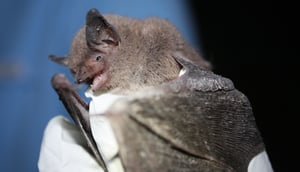News
KANSAS CITY, Missouri — With approval from the U.S. Fish & Wildlife Service, Burns & McDonnell opened a first-of-its-kind conservation bank in northern Missouri. The 1,300-acre Chariton Hills Conservation Bank is the first conservation bank approved in Missouri and the first conservation bank in the United States to protect the Indiana bat and northern long-eared bat.
Conservation banks are areas of land set aside to permanently protect threatened or endangered species and their habitats. Developers who need environmental solutions for their projects can use credits from the bank to compensate for anticipated adverse impacts to similar, nearby habitat.
Chariton Hills offers credits to offset habitat impacts throughout the state of Missouri.“Collaborative conservation projects, such as the Chariton Hills Conservation Bank, are an integral component of listed bat recovery in Missouri,” says Shauna Marquardt, fish and wildlife biologist for U.S. Fish and Wildlife Service. “The Missouri Field Office of the U.S. Fish and Wildlife Service was supportive of the conservation bank because it provides upfront compensation for future impacts to species and helps streamline the regulatory process. It’s a tool that is beneficial to listed species and project proponents. Burns & McDonnell has been a good partner in the development of the conservation bank because they brought a wealth of experience in both mitigation project development and bat ecology.”
The bats inhabit caves and forests in the eastern and midwestern U.S. Upon emergence from hibernation in the spring, the Indiana and northern long-eared bats migrate to establish summer maternity colonies in suitable habitat throughout northern Missouri, southern Iowa and western Illinois. The newly established bank provides conserved summer foraging and roosting habitat for the Indiana bat and the northern long-eared bat, both federally listed under the Endangered Species Act.

“We are excited to assist the U.S. Fish & Wildlife Service, the Missouri Conservation Heritage Foundation and their partners to meet regional conservation goals,” says Josiah Maine, bat specialist and land manager in the Environmental Services Group with Burns & McDonnell. “The conservation bank helps effectively manage and protect the bats by conserving land and consolidating smaller mitigation requirements into a larger, more ecologically viable site. We can also provide value to our clients, with bank credits that control costs and provide a permanent, expedited environmental permitting solution.”
The Chariton Hills Conservation Bank will be protected in perpetuity by a conservation easement held by the Missouri Conservation Heritage Foundation.
“The concentration of Indiana and northern long-eared bats in this tri-state area presents significant opportunities to benefit the species,” says Kevin Roper, executive director for the Missouri Conservation Heritage Foundation. “We are proud to work with Burns & McDonnell to develop this conservation resource in Missouri. By working with a locally based strategic partner, we know this habitat will be responsibly managed and protected in perpetuity.”
Learn more about Chariton Hills Conservation Bank and Burns & McDonnell mitigation projects at mitigationbankingusa.com.
Burns & McDonnell’s growing workforce of more than 400 environmental professionals is focused on providing integrated environmental services — from planning and permitting to compliance and remediation — for clients nationwide.
About Burns & McDonnell
Burns & McDonnell is a family of companies made up of more than 6,000 engineers, architects, construction professionals, scientists, consultants and entrepreneurs with offices across the country and throughout the world. We strive to create amazing success for our clients and amazing careers for our employee-owners. Burns & McDonnell is 100 percent employee-owned and is proud to be on Fortune’s 2018 list of 100 Best Companies to Work For.
- Company Logo
- Release - Burns & McDonnell Establishes Missouri's First Conservation Bank
- Contact Photo - Josiah Maine, bat specialist and land manager in the Environmental Services Group with Burns & McDonnell
- Photo - Adair Woodland: The 1,300-acre Chariton Hills Conservation Bank is the first conservation bank in Missouri and first nationwide to protect the Indiana bat and northern long-eared bat.
- Photo - Indiana Bat: The conservation bank will protect the Indiana bat (pictured) and the northern long-eared bat, both federally listed under the Endangered Species Act.
- Website - Chariton Hills Conservation Bank
- Industry - Environmental
- Corporate Profile

816-652-2958 Get in touch